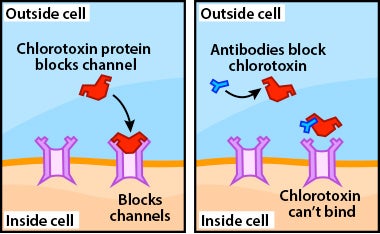Antivenom
The sting of a deathstalker scorpion is usually not strong enough to kill a human being. It is, however, extremely painful. It also causes headaches, drowsiness and swelling. Fortunately, scientists have discovered ways to stop the harmful effects of venom with antivenom (also known as antivenin).
Venom from different animals work in different ways, and is usually made of more than one kind of toxin. Antivenom then, usually includes many different molecules to stop the effects of different toxins in the body.
To understand how antivenom works, lets first take a moment to review what venom does to your cells, using deathstalker scorpion venom as an example. This kind of venom contains a protein called chlorotoxin, which blocks channels on the cells' surface. In order for your cells to work correctly and send signals, they must remain open to allow other molecules to pass in and out.

Once the channels are blocked, the muscle cells can't relax. It makes me tense just thinking about it! In order to stop this from happening, antivenom has molecules called antibodies that have just the right shape to bind to chlorotoxin proteins after they've entered the body. This changes the shape of the toxin, making it impossible for it to bind to and block the channels.
Antivenom cannot reverse the effects of venom once they've begun, but it can prevent it from getting worse. In other words, antivenom cannot un-block a channel once it's already been blocked. Over time, your body will repair the damage caused by the venom, but antivenom can make it a much smaller repair job.
Most bug bites don't require treatment by a doctor, but if you're not sure, it doesn't hurt to ask! Snake bites and scorpion stings should be looked at by a doctor, especially if you're not sure what kind of snake or scorpion it was. If you do need first aid, getting treatment as quickly as possible will give the antivenom time to work before more harm is done.
Venom Vaccines
Tiny amounts of actual venom can sometimes be given to a person before they've been bitten or stung to try to get the person's immune system to quickly recognize and respond to toxic proteins in the venom. Unfortunately, the tiny amounts of venom have to be injected often and the effects don't always last. This is really only useful for people who have to work with specific venomous animals on a regular basis.
Read more about: Venom!
Bibliographic details:
- Article: Antivenom
- Author(s): Dr. Biology
- Publisher: Arizona State University School of Life Sciences Ask A Biologist
- Site name: ASU - Ask A Biologist
- Date published: 16 Aug, 2012
- Date accessed: 17 May, 2025
- Link: https://askabiologist.asu.edu/venom/antivenom
APA Style
Dr. Biology. (Thu, 08/16/2012 - 16:11). Antivenom. ASU - Ask A Biologist. Retrieved from https://askabiologist.asu.edu/venom/antivenom
Chicago Manual of Style
Dr. Biology. "Antivenom". ASU - Ask A Biologist. 16 Aug 2012. https://askabiologist.asu.edu/venom/antivenom
MLA 2017 Style
Dr. Biology. "Antivenom". ASU - Ask A Biologist. 16 Aug 2012. ASU - Ask A Biologist, Web. https://askabiologist.asu.edu/venom/antivenom
Be Part of
Ask A Biologist
By volunteering, or simply sending us feedback on the site. Scientists, teachers, writers, illustrators, and translators are all important to the program. If you are interested in helping with the website we have a Volunteers page to get the process started.




